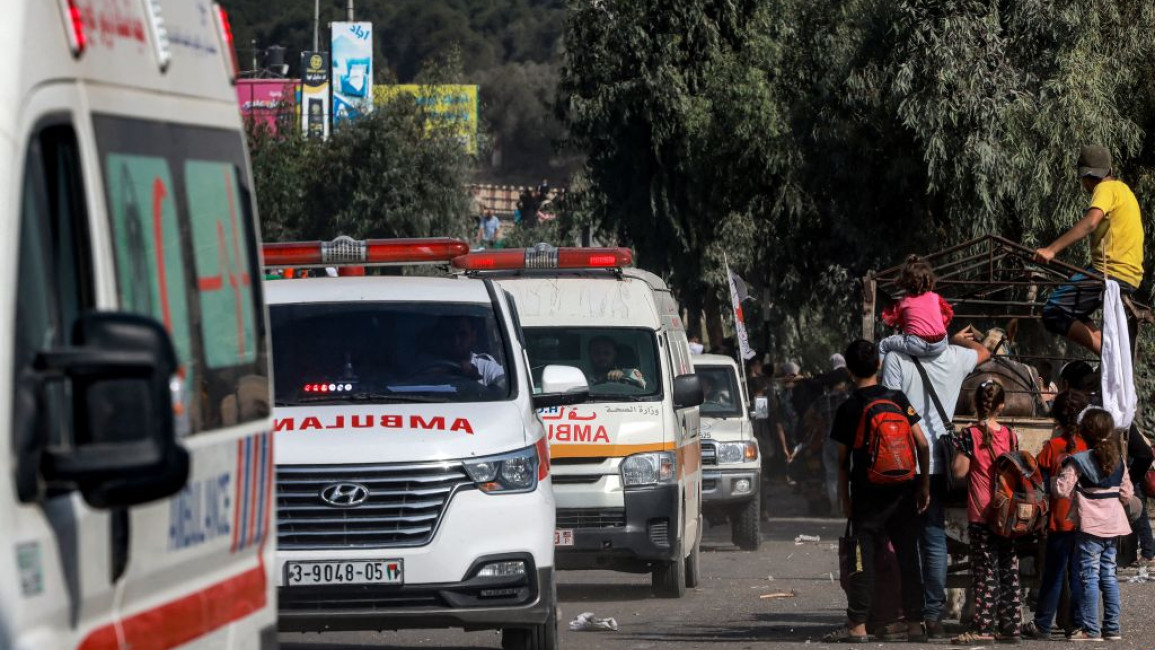Palestinians in Gaza accuse ICRC of 'failing in its obligations'
Several Palestinians in Gaza say that the International Committee of the Red Cross (ICRC) has been ignoring their calls to help and is willfully failing "in its obligations" to protect civilians.
"We appealed to the ICRC hundreds of times to help us rescue my friend and her entire family in the al-Nasr neighbourhood, but they did not answer us," Mariam Kamal, one young woman, said to The New Arab.
A few days ago, the Israeli army encircled the al-Mahdi hospital in Gaza before attacking it with artillery. "My friend Samira Mahdi called me and asked me to communicate with the ICRC to rescue them from death. [ICRC] did not listen to me," Mariam recalled.
Mariam then contacted several groups on WhatsApp and tried to reach many journalists who could help her. Unfortunately, all her attempts to help her friend's family failed. The Israeli army attacked the whole building, killing two doctors and members of their family.
"They were innocent civilians... They were not involved in any military operations against Israel. They were killed in cold blood," the 24-year-old Mariam said, her eyes tearing up.
She accused ICRC of being equally responsible as the Israeli army, saying that it was an international organisation "failing in its obligations" in protecting civilians in Gaza.
Many Gazans share her sentiment, particularly against ICRC, a renowned international humanitarian organisation with the stated mandate of "ensuring humanitarian protection and assistance for victims of war and other situations of violence."
But there is no safe place in the entirety of the Gaza Strip as Israel continues to bomb the coastal enclave indiscriminately. For countless families who try to reach out to ICRC and other international organisations for help, they often find no response to their pleas.
Al-Safadi family was one family who was entirely wiped out by Israeli airstrikes that hit their house in the Tal al-Hawa neighbourhood in Gaza City.
"The thought that they will not attacked by the army as they were innocent civilians (...) unfortunately, all of the family members were killed by the army," Shimaa al-Safadi, the granddaughter of the Safadi family, said.
"We called the ICRC more than 100 times. When they replied, they told us they could not do anything for us. They cannot help our family. They left my relatives to die without even trying to help them," she added.
Still, Shimaa hoped ICRC would help rescue her cousins and relatives who remained under the rubble. She kept in contact with her cousin Lojain, who, for the moment, was alive under the rubble. Ultimately, Lojain's voice went silent, and so did any hope.
"They killed all of us. I will never forget the tragic moments we were forced to experience under the current madness of conflict between Hamas and Israel," she remarked to TNA.
She held international humanitarian and nongovernmental organisations as responsible as the Israeli army, which "committed thousands of crimes against civilians in Gazas."
Since 7 October, Israel launched a war against the besieged coastal enclave after Hamas, the Islamist group ruling the territory, carried out an unprecedented attack, killing and wounding at least 1,200 Israelis.
The Hamas-led forces also captured at least 240 Israelis, hoping for a prisoner swap deal to release more than 5,000 Palestinian prisoners held in Israeli jails.
More than 11,500 Palestinians, mostly women and children, were killed and over 29,000 wounded by the Israeli army, according to the health ministry in Gaza.
For its part, a senior official at ICRC said to TNA that the organisation was "gravely concerned" by the precarious and unsafe conditions under which civilians are evacuating as a result of the ongoing Israeli aggression.
"We are doing our best to evacuate the civilians from the dangerous places, but unfortunately, our teams were subjected to the Israeli fires," the official asserted.
"This is why we were unable to reach some people, mainly those in the most dangerous areas in Gaza City and the north of the coastal enclave," he added. "Every day, the ICRC teams in Gaza and hotline operators receive numerous calls from displaced people searching for their family members. It is paramount that members of the same family are not separated during evacuations."



